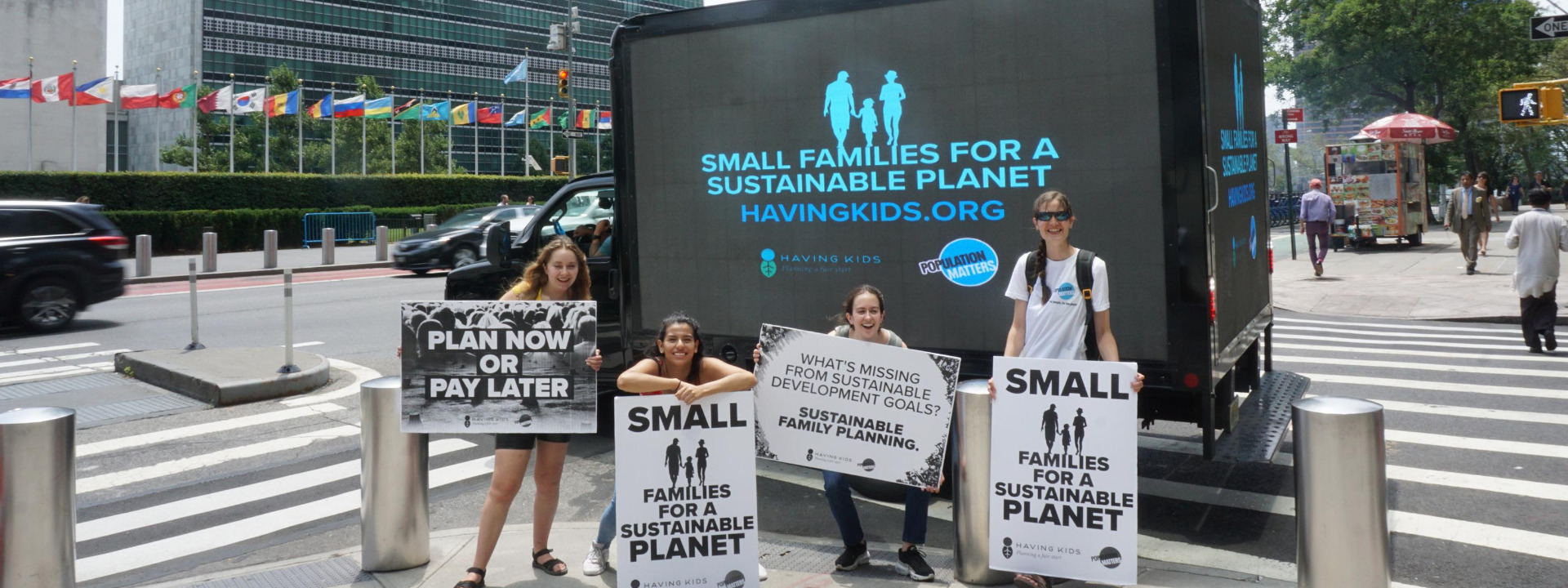
It’s time to end harmful population denial
Polemicist and pundit George Monbiot’s recent opinion piece in The Guardian claims (once again) that addressing the population issue is “blaming the poor” and “racist”. Population Matters Director Robin Maynard replies to these unjustified and irrational accusations and explains why population denial hurts everyone, especially the world’s most vulnerable.

This is a response to ‘Population panic lets rich people off the hook for the climate crisis they are fuelling‘, published on The Guardian’s website on 26 August 2020.
George Monbiot talks of “population obsessives” but he is himself in danger of becoming one. Obsessed with the past – Malthus wrote his ‘Essay on the Principle of Population’ over 200 years ago! Obsessed with highlighting the worst, historic examples of ‘population control’ measures by despicable regimes in China and India; ignoring the modern progressive, women-focused family planning programmes in countries like Bangladesh. Obsessed with a conveniently simplistic binary analysis of our global ecological crisis – that it’s fuelled only by modern capitalism.
Rather than “letting rich people off the hook” as Monbiot claims, Population Matters consistently highlights the moral duty and necessity of addressing consumption rates in rich countries like the UK – the birth-place of the Industrial Revolution and so progenitor of climate change. When we talk about the benefits to people and planet of achieving a more sustainable population, we emphasise the disproportionate impact of people in high-consuming countries like the UK making the individual, responsible choice to have smaller families, so bringing wider societal and environmental benefits, as evidenced by research from Lund University, reported on by The Guardian previously (‘Want to fight climate change? Have fewer children’).
Addressing the factor of population alongside consumption was highlighted by the Global Footprint Network (GFN) on Earth Overshoot Day, which fell on August 22nd. GFN identified five key solutions pillars for bringing humanity into balance on an equitable basis with the Earth’s available, sustainable resources. Population is one of those pillars. According to GFN, if every other family had one fewer child than currently expected and parenthood was postponed by two years, then by 2050, Overshoot Day would move back 49 days. Hence, GFN made it their second most powerful solution after decarbonising our economies. It’s not either or, but both, as GFN’s Chief Executive, Laurel Hanscom states unequivocally:
“It’s a false dichotomy that you talk about one or the other… you have to talk about consumption, and you have to talk about population. They go hand in hand, and there are different solutions for different parts of the world.”
That analysis is underpinned by the conclusions of Project Drawdown, which identified the available practical policy measures for minimising greenhouse gas emissions. Drawdown analysed more than eighty policy options, from shifting to plant-based diets, to increasing solar farms and use of electric vehicles, but ranked family planning and educating girls in its top 10 workable solutions to combat climate change. Combined, those would reduce CO2 emissions by 85 Gigatonnes by 2050 – more than all current onshore and offshore wind power. The researchers’ comments on those findings exemplify our approach:
“Honouring the dignity of women and children through family planning is not about governments forcing the birth rate down (or up, through natalist policies). Nor is it about those in rich countries, where emissions are highest, telling people elsewhere to stop having children. When family planning focuses on healthcare provision and meeting women’s expressed needs, empowerment, equality, and well-being are the result; the benefits to the planet are side effects. Education lays a foundation for vibrant lives for girls and women, their families, and their communities. It also is one of the most powerful levers available for avoiding emissions by curbing population growth.”
An inconvenient, controversial fact, which Monbiot chooses to ignore, is that current growth in consumption is greatest in the developing world, in those same countries where population growth has until relatively recently been amongst the highest. By his flawed logic, if highlighting population growth is “poor- blaming”, “finger-pointing” and “racist”, then highlighting consumption growth which is highest in those same countries must surely also be? Clearly absurd. We want to see a greater proportion of people globally enjoying better, sustainable lives. Not as Monbiot’s logic would result in, the poor staying poor. Those of us consuming too much must cut our demands – as GFN’s Overshoot calculator shows, if the UK’s consumption rates were replicated globally, three planets worth of resources would be needed.
Progressive, sustainable population policies are not a ‘one-size fits all’. The UK doesn’t have any such policy, but other countries, like Nigeria, which I visited last year, do. It was powerful to hear speakers at the World Population Day event I attended in Lagos speak openly about the need to address population without any of the negative stereotyping or old shibboleths that Monbiot clings onto. Nigeria’s Environment Minister demonstrated an in-depth understanding of the issue and its impacts, referred ironically to “our experimental growth” (Nigeria is Africa’s most populous country, with a current population of 200 million people projected to grow to over 400 million by 2050), and affirmed the ‘double-dividend’ benefits to people and planet of enabling girls access to education and family planning, whilst highlighting the much too slow progress.
Monbiot comes across as a well-off white man, using his privileged position as a polemicist to display his ideological credentials, choosing to exclude the inconvenient facts and realities faced and expressed by those ‘poor people’ across the world he purports to speak on behalf of. Population Matters works with and gives voice to those living in communities who desperately want the right and means to choose when and how many children to have, and so have the opportunity to fulfil their potential as individuals. People like Wendo Aszed, who set up Dandelion Africa to improve the lives of women in her community:
“Our greatest resource is working together; this is not any different in sexual and reproductive health. For girls and women of reproductive age to access contraceptives, without fear, without stigma, we must educate our young men to understand that sexual and reproductive health is a right for all women, and that when we plan, we thrive.”
Only last week, we had a video call with a potential new partner community group in Uganda, hearing horrific accounts of the inability of women there to access contraception due to the stigma and gender-based violence they faced. Including the case of a woman who’d had a contraceptive implant fitted without her husband’s permission and was subsequently attacked by him and other men from her village, the implant ripped from her arm.
Population Matters is not concerned only with ‘poor people’ in developing countries, but also supports vulnerable women and young girls in wealthy countries like the UK. Whilst the UK has significantly reduced the teenage pregnancy rate over the past decade, it remains higher than comparable western European countries. Unprecedented family planning funding cuts over the past five years, alongside the delay in the rollout of statutory RSE (relationships and sex education) and the impact of COVID-19, will have far-reaching, long-term implications for both our young people and the planet.
Monbiot grudgingly acknowledges that “there are some genuine ecological impacts of population growth” and sets the criteria he judges those: “So a good way of deciding whether someone’s population concerns are genuine is to look at their record of campaigning against structural poverty”.
He has failed to follow his own advice. If he had, he would see that Population Matters’ concerns are rooted in addressing global poverty, inequity, human rights and especially the empowerment of women. As clear in our report, Hitting the Targets, published on this year’s World Population Day, 11 July 2020, which examined the relationship between achieving the Sustainable Development Goals (SDGs) and population – coinciding with the UN’s admission that many of its targets are set to be missed. From protecting endangered species to ending hunger and the unmet need for contraception – on many critical measures we are going backwards. These are the issues we care about and campaign on, population concern being a common thread. Not an obsessively pursued one, but one integrated with addressing the same inequities that rightly outrage Monbiot.
He saves his most contradictory argument to the last. Returning to the population projections recently published in The Lancet with which he opened his article, Monbiot seems to have fallen for the sensational headlines used by others in the media referring to a “jaw-dropping crash” in the number of babies being born. It is important to bear in mind that these figures are just another set of estimates heavily dependent on a huge range of assumptions, including our rate of progress towards the SDGs. One key finding of the Lancet study was that slower progress towards the SDG targets related to education and meeting contraception needs would result in a population of 13.6bn by 2100 – much higher than the UN’s widely accepted projection of 10.9bn. Significant progress setbacks are indeed already happening due to the current health crisis. In contrast, faster progress in line with what is required to meet these SDG targets would lead to a total population size of 6.3bn by the end of the century – surely something we should be aiming for!
Aping the very type of classical growth economist, he usually abhors, Monbiot warns of economic doom unless population growth is maintained to drive economic growth, of a “shrinking tax base” and a “dearth of key workers”. This is nothing more than pyramid selling: more people, more workers, more consumers, more young people to look after us in our old age (until they too become old…). Worse, authoritarian, patriarchal regimes are using these arguments to introduce regressive policies and remove women’s rights. For example, Iran has discarded its earlier positive family planning programme and is now restricting access to contraception.
A previous, environmental correspondent for The Guardian, John Vidal, raised the issue of population in his swan-song article for the paper in 2016, ‘The seven deadly things we’re doing to trash the planet (and human life with it)’. At number four he ranked Human Population, headlining the issue as, ‘The one nobody wants to talk about’. We must – for the sake of our environment, current and future generations.
